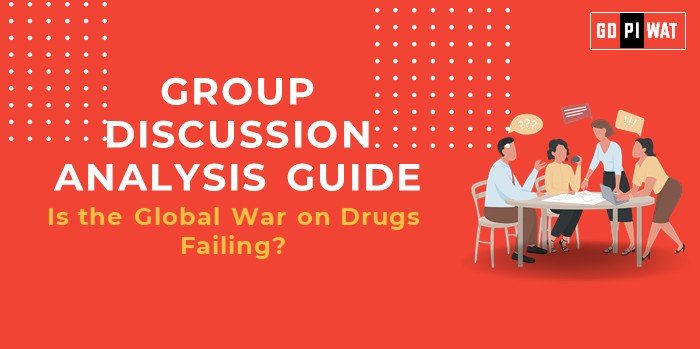📋 Group Discussion (GD) Analysis Guide
💡 Topic: Is the Global War on Drugs Failing?
🌐 Introduction to the Topic
- Opening Context: “The global war on drugs, a decades-long initiative to curb illicit drug use, trafficking, and production, has sparked intense debate over its efficacy and consequences.”
- Topic Background: Originating with initiatives such as the 1971 declaration by U.S. President Nixon, the ‘war on drugs’ aimed to tackle illegal drug economies. Today, with billions spent and persistent global drug issues, questions about its success have surfaced.
📊 Quick Facts and Key Statistics
• 🌍 Global Drug Trade Value: $400 billion+ annually (UNODC, 2023) – highlights the vast economic scale of illicit drugs.
• ⚰️ Drug-Related Deaths: Over 500,000 annually (WHO, 2022) – indicates the severe human cost.
• 🌏 Countries Decriminalizing Drugs: 30+ nations, including Portugal and Uruguay – shows shifting global policy trends.
• 📜 Prison Population: 20% of prisoners globally incarcerated for drug offenses (UNODC, 2023) – reflects enforcement focus.
• ⚰️ Drug-Related Deaths: Over 500,000 annually (WHO, 2022) – indicates the severe human cost.
• 🌏 Countries Decriminalizing Drugs: 30+ nations, including Portugal and Uruguay – shows shifting global policy trends.
• 📜 Prison Population: 20% of prisoners globally incarcerated for drug offenses (UNODC, 2023) – reflects enforcement focus.
🤝 Stakeholders and Their Roles
- 🏛️ Governments: Create and enforce drug policies, regulate rehabilitation.
- 🌐 International Organizations: UNODC, WHO – monitor and guide global drug strategies.
- 🤝 Civil Society: Advocacy groups promote harm reduction and policy reform.
- 🎭 Drug Traffickers and Users: Primary targets of enforcement; often affected by systemic inequities.
🏆 Achievements and ⚠️ Challenges
Achievements:
- ✨ Decriminalization Success: Portugal’s drug decriminalization (2001) reduced overdose deaths by 80%.
- 📈 Technological Advances: Improved tracking of illegal drug flows via AI and analytics.
- 📣 Awareness Campaigns: Reduced stigma in many nations, increasing treatment uptake.
Challenges:
- 📦 Persisting Supply: Global opium production rose by 10% in 2023.
- 🏢 Overcrowded Prisons: Punitive policies lead to systemic overburdening.
- ⚖️ Corruption and Inequity: Enforcement disproportionately targets marginalized communities.
🌍 Global Comparisons:
- 🇵🇹 Portugal: Harm reduction focus lowered public health crises.
- 🇵🇭 Philippines: Aggressive tactics led to human rights concerns without significantly reducing drug problems.
Case Study: 🇺🇸 US Opioid Crisis: Despite $1 trillion spent on the drug war, overdose deaths reached 100,000 in 2022.
📖 Structured Arguments for Discussion
- 📈 Supporting Stance: “The war on drugs has reduced some aspects of global trafficking networks and raised public awareness.”
- 📉 Opposing Stance: “High incarceration rates and persistent drug availability show the war on drugs is failing.”
- ⚖️ Balanced Perspective: “While there have been some successes, the focus must shift to harm reduction and decriminalization.”
🎯 Effective Discussion Approaches
Opening Approaches:
- 📜 Quote: “The definition of insanity is doing the same thing over and over and expecting different results.” – Einstein.
- 📊 Statistic: “Despite $100 billion spent annually, drug usage rates remain unchanged globally.”
Counter-Argument Handling:
- 💡 Rebuttal: “Focusing on rehabilitation rather than incarceration has yielded proven results, as seen in Portugal.”
🛠️ Strategic Analysis of Strengths and Weaknesses
SWOT Analysis:
- Strengths: Raised awareness, improved tracking technologies.
- Weaknesses: Enforcement disparities, failure to curb supply.
- Opportunities: Decriminalization, harm reduction policies.
- Threats: Organized crime, global health crises.
🌍 Connecting with B-School Applications
- 📈 Real-World Applications: Projects in public policy reform, social justice, or international relations.
- 📚 Sample Interview Questions:
- 💡 “How would you evaluate the success of the global war on drugs?”
- 🔍 “What alternative models could replace punitive policies?”
- 📖 Insights for Students: Explore cross-disciplinary solutions combining policy, public health, and law.


